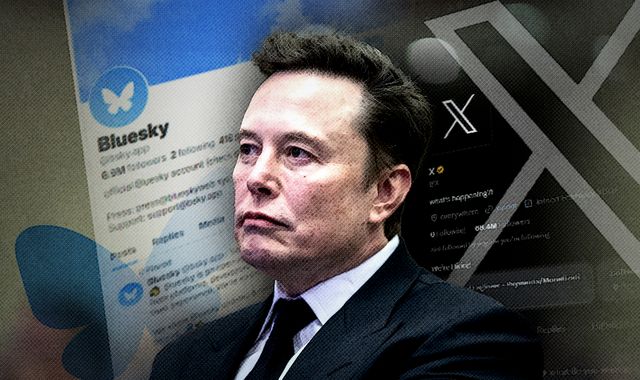
The X exodus - could Bluesky spike spark end of Elon Musk's social media platform?

Actress Jamie Lee Curtis, The Guardian newspaper, and even the Clifton Suspension Bridge have joined swathes of people deserting Elon Musk's social media site X.
Millions have instead joined Bluesky, which has a stronger focus on moderation, set up by former Twitter founder Jack Dorsey - who is now no longer affiliated with the social media platform - in 2019.
According to the official Bluesky account, a million people joined the platform in just one day this week, after Musk was given a position in Donald Trump's government.
"The alignment of Mr Musk with president-elect Trump and his use of the platform to promote the interests of president-elect Trump is obviously driving out a lot of people," says Adam Tinworth, a social media expert and digital journalism lecturer at City St George's University.
But, he says, this is just the latest exodus from Musk's platform - and people aren't just leaving for political reasons.
"Many of us for whom Twitter was a major part of our social network landscape have been backing away just on pragmatic grounds, [because] the algorithm has been retuned," he says.
When Musk bought Twitter in October 2022, he cut roughly 80% of the company's workforce, according to an interview he gave the BBC.
That "gutting" of the organisation, says Mr Tinworth, has resulted in a worse experience on the platform.
"There aren't the same resources behind it and his priorities for what he's doing there are not necessarily driven towards the trust and safety end of it, which is content moderation, removing bots from the system, those sorts of things."
Read more: The Guardian quits Elon Musk's X social media platform
The lack of moderation appears to be impacting life outside of X too.
Jason Barnard, the chief executive of Kalicube, spent nine years gathering three billion different data points that Google uses to decide what is factual information.
He told Sky News that although X has a long-standing agreement with Google to allow the search engine to use X posts to help it understand the world, Google's trust appears to be waning.
"Bluesky is 20 times smaller in terms of the number of people on the platform," he says. "If you search for people [on Google], you will find Bluesky 10 times less often than you will find X.
"But," he says, "it's 10 times more important to Google today for factual information."
Even when it comes to Musk's own daughter Vivian Jenna Wilson, Mr Barnard says the search engine appeared to trust Bluesky over X.
"She doesn't use [Bluesky], but Google trusts it for information about her."
And as more people use the platform, huge search engines like Google and AI models like ChatGPT will start to trust it even more.
However, people aren't just migrating to Bluesky.
After Musk began changing X, many in the tech community disappeared off to a social site called Mastodon. LinkedIn hosts a business crowd, TikTok is famously popular with young people, Meta's Threads has enticed some creatives and Discord is where gamers go to chat.
"We are beginning to see this sort of fragmentation, this diaspora of what used to be a singular platform, into communities split into multiple places," says Mr Tinworth.
"The potential negativity that comes out of it is if those communities form purely along ideological lines, and then you get a situation where you have greater entrenchment of political divisiveness."
In that sense, one expert says it matters less about who is leaving X, and more about who is staying behind.
More from climate, science and tech:
Apple sued - with potential payout for 40 million UK customers
There's already a risk COP29 will end in failure
Changes to our lives are certain if PM meets bold climate target
Dr Steven Buckley has spent years studying how social media impacts political communication. He says X's impact on things like elections or political opinions is large, but "second-hand".
"[X] doesn't have a particularly large population base compared to the likes of Instagram, TikTok, Facebook," he says. "But the people that are on X are the movers and shakers of the political world and of many other industries.
"When politicians are seeing content on Twitter and journalists are seeing content on X, then that filters out through the rest of the mainstream media."
Because a lot of the migrants from X to Bluesky are more left-wing, according to Dr Buckley, that means there'll still be right-wing figures and journalists on X but without as much political debate.
"X is becoming even more of an echo chamber for the right wing," he says.
So with the social media landscape becoming even more fractured, will Bluesky actually replace Elon Musk's X?
"The value of social networks to the user is based on the number of people there," says Mr Tinworth. "Networks have to reach a critical mass of users before they actually manage to take off.
"Bluesky is picking up waves of users and the community is pushing it towards a level of sustainability.
"So yes, it's possible we might do it."
Sky News contacted X for comment but received no response.





